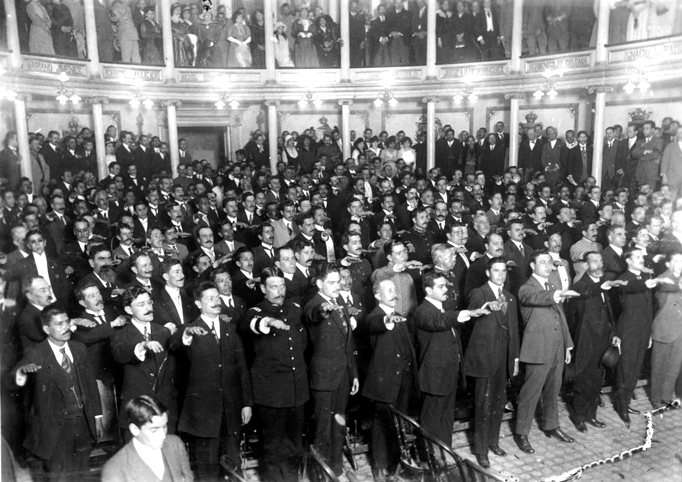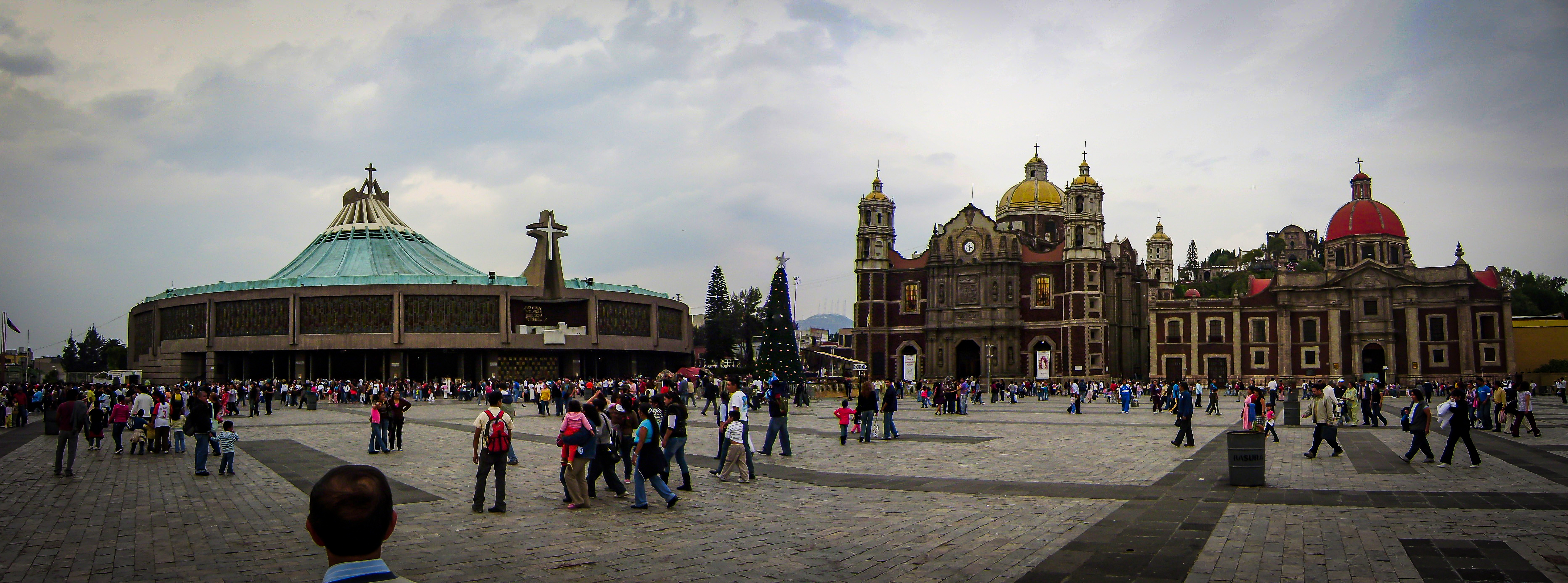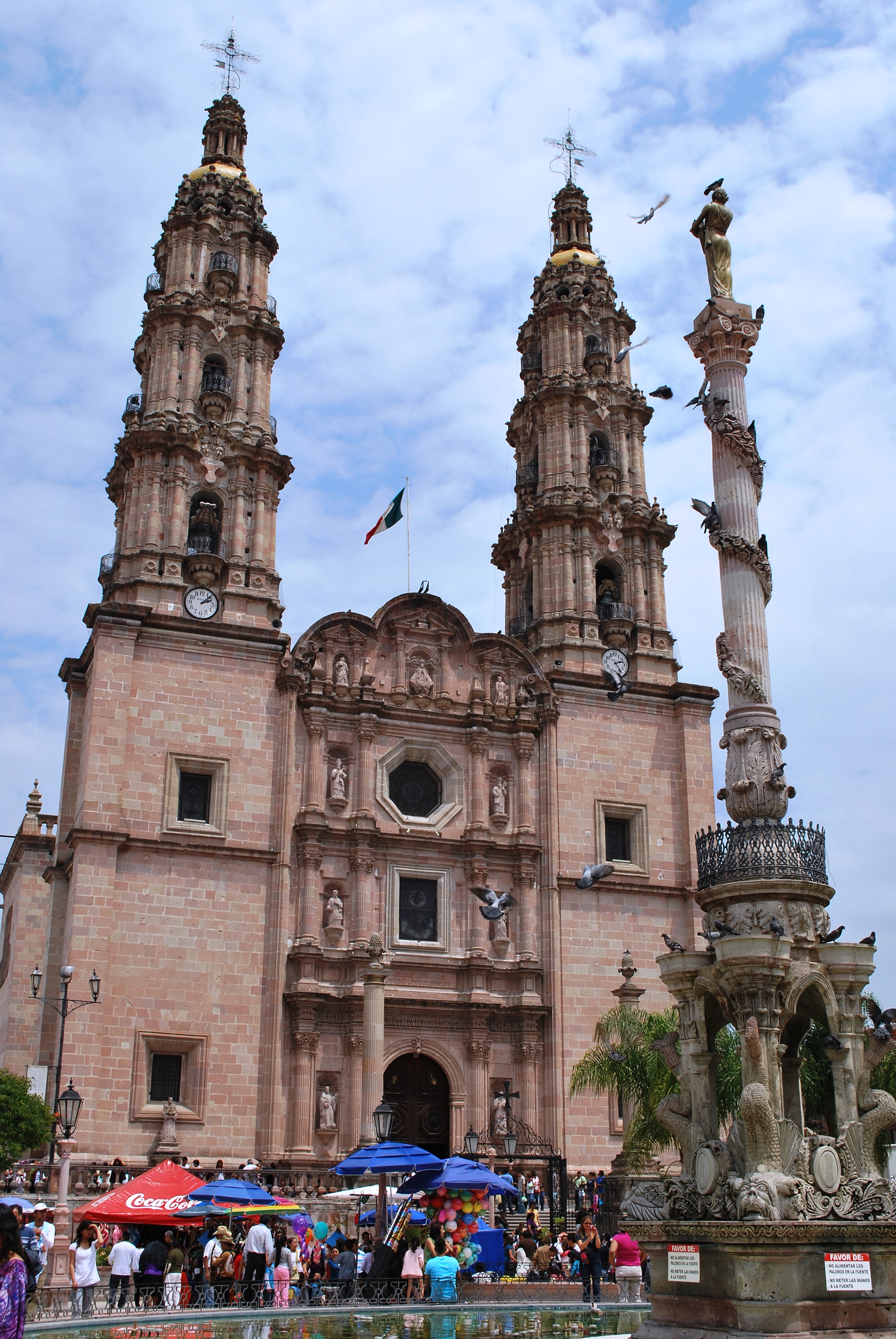|
Mexico
Mexico, officially the United Mexican States, is a country in North America. It is the northernmost country in Latin America, and borders the United States to the north, and Guatemala and Belize to the southeast; while having maritime boundary, maritime boundaries with the Pacific Ocean to the west, the Caribbean Sea to the southeast, and the Gulf of Mexico to the east. Mexico covers 1,972,550 km2 (761,610 sq mi), and is the List of countries by area, thirteenth-largest country in the world by land area. With a population exceeding 130 million, Mexico is the List of countries by population, tenth-most populous country in the world and is home to the Hispanophone#Countries, largest number of native Spanish speakers. Mexico City is the capital and List of cities in Mexico, largest city, which ranks among the List of cities by population, most populous metropolitan areas in the world. Human presence in Mexico dates back to at least 8,000 BC. Mesoamerica, considered a cradle ... [...More Info...] [...Related Items...] OR: [Wikipedia] [Google] [Baidu] |
Mexico City
Mexico City is the capital city, capital and List of cities in Mexico, largest city of Mexico, as well as the List of North American cities by population, most populous city in North America. It is one of the most important cultural and financial centers in the world, and is classified as an Globalization and World Cities Research Network, Alpha world city according to the Globalization and World Cities Research Network (GaWC) 2024 ranking. Mexico City is located in the Valley of Mexico within the high Mexican central plateau, at an altitude of . The city has 16 Boroughs of Mexico City, boroughs or , which are in turn divided into List of neighborhoods in Mexico City, neighborhoods or . The 2020 population for the city proper was 9,209,944, with a land area of . According to the most recent definition agreed upon by the federal and state governments, the population of Greater Mexico City is 21,804,515, which makes it the list of largest cities#List, sixth-largest metropolitan ... [...More Info...] [...Related Items...] OR: [Wikipedia] [Google] [Baidu] |
Mexicans
Mexicans () are the citizens and nationals of the Mexico, United Mexican States. The Mexican people have varied origins with the most spoken language being Spanish language, Spanish, but many also speak languages from 68 different Languages of Mexico, Indigenous linguistic groups and other languages brought to Mexico by expatriates or recent immigration. In 2020, 19.4% of Mexico's population identified as Indigenous peoples of Mexico, Indigenous. There are currently about 12 million Mexican nationals residing outside Mexico, with about 11.7 million living in the United States. The larger Mexican diaspora can also include individuals that trace ancestry to Mexico and self-concept, self-identify as Mexican but are not necessarily Mexican citizenship, Mexican by citizenship. The United States has the largest Mexican population in the world after Mexico at 10,918,205 in 2021. The modern nation of Mexico achieved independence from the Spanish Empire in 1821, after a decade-long war ... [...More Info...] [...Related Items...] OR: [Wikipedia] [Google] [Baidu] |
Claudia Sheinbaum
Claudia Sheinbaum Pardo (born 24 June 1962) is a Mexican politician, energy and climate change scientist, and academic who has served as the 66th president of Mexico since 2024. She is the List of elected and appointed female heads of state and government, first woman to hold the office. A member of the Morena (political party), National Regeneration Movement (Morena), she previously served as List of mayors of Mexico City, Head of Government of Mexico City from 2018 to 2023. In 2024, ''Forbes'' ranked Sheinbaum as Forbes list of the World's 100 Most Powerful Women, the fourth most powerful woman in the world. A scientist by profession, Sheinbaum received her Doctor of Philosophy in energy engineering from the National Autonomous University of Mexico (UNAM). She has co-authored over 100 articles and two books on energy, the environment, and sustainable development. She contributed to the Intergovernmental Panel on Climate Change and, in 2018, was named one of 100 Women (BBC), BB ... [...More Info...] [...Related Items...] OR: [Wikipedia] [Google] [Baidu] |
Mexican War Of Independence
The Mexican War of Independence (, 16 September 1810 – 27 September 1821) was an armed conflict and political process resulting in Mexico's independence from the Spanish Empire. It was not a single, coherent event, but local and regional struggles that occurred within the same period, and can be considered a List of wars of independence, revolutionary civil war. It culminated with the drafting of the Declaration of Independence (Mexico), Declaration of Independence of the Mexican Empire in Mexico City on September 28, 1821, following the collapse of royal government and the military triumph of forces for independence. Mexican independence from Spain was not an inevitable outcome of the relationship between the Spanish Empire and its most valuable overseas possession, but events in Spain had a direct impact on the outbreak of the armed insurgency in 1810 and the course of warfare through the end of the conflict. Napoleon, Napoleon Bonaparte's Peninsular War, invasion of Spa ... [...More Info...] [...Related Items...] OR: [Wikipedia] [Google] [Baidu] |
Chamber Of Deputies (Mexico)
The Chamber of Deputies ( Spanish: , ) is the lower house of the Congress of the Union, the bicameral parliament of Mexico. The other chamber is the Senate. The structure and responsibilities of both chambers of Congress are defined in Articles 50 to 70 of the Constitution. History A bicameral legislature, including the Chamber of Deputies, was established on 4 October 1824. A unicameral congress existed from 7 September 1857 to 13 November 1874. Elections and qualifications Qualifications Article 55 of the Mexican Constitution establishes the requirements to serve as a deputy. To be eligible, a candidate must: * Be a Mexican citizen by birth with full legal rights. * Be at least 18 years old on election day. * Be a resident of, or have lived in, the state they seek to represent for at least six months prior to the election. * Not be on active military duty or hold a police command within 90 days before the election. * Not be a minister of any religious faith. The ar ... [...More Info...] [...Related Items...] OR: [Wikipedia] [Google] [Baidu] |
Catholic Church In Mexico
The Mexican Catholic Church, or Catholic Church in Mexico, is part of the worldwide Catholic Church, under the spiritual leadership of the Pope, his Roman Curia, Curia in Rome, and the national Mexican Episcopal Conference. According to the Mexican census, Roman Catholicism is the dominant religion in Mexico, practiced by 77.7 percent of the population in 2020. A Statistica survey suggests this number could be a little lower, suggesting Catholics could make up 72 percent of the nation. The history of the Catholic Church in Mexico dates from the period of the Spanish conquest of the Aztec Empire (1519–1521) and it has continued as an institution in Mexico into the twenty-first century. In the late 20th century, Eastern Catholic Churches, Eastern Catholic jurisdictions were also established in Mexico. In many parts of the country, Catholic Christianity is heavily syncretized with folk customs; and Aztec, Maya religion, Mayan, and other pre-Columban religions. History The h ... [...More Info...] [...Related Items...] OR: [Wikipedia] [Google] [Baidu] |
Christianity In Mexico
Christianity is the predominant religion in Mexico comprising 91.3% of the population. Roman Catholicism in Mexico, Catholicism is its largest denomination representing around 78% of the total population as of 2020 census. In recent decades the share of Catholics has been declining, due to the growth of other Christianity, Christian denominations – especially various Protestantism, Protestant churches, Jehovah's Witness and Mormonism – which now constitute larger shares of the population. Conversion to non-Catholic denominations has been considerably lower than in Central America, and central Mexico remains one of the most Catholic areas in the world. Mexico is a secular country and has allowed freedom of religion since the mid-19th century. Mainline Protestant, Mainline Protestant denominations and the open practice of Judaism established themselves in the country during La Reforma, that era. Modern growth has been seen in Evangelical Protestantism, Mormonism and in folk ... [...More Info...] [...Related Items...] OR: [Wikipedia] [Google] [Baidu] |
Religion In Mexico
Christianity is the predominant religion in Mexico comprising 91.3% of the population. Catholicism is its largest denomination representing around 78% of the total population as of 2020 census. In recent decades the share of Catholics has been declining, due to the growth of other Christian denominations – especially various Protestant churches, Jehovah's Witness and Mormonism – which now constitute larger shares of the population. Conversion to non-Catholic denominations has been considerably lower than in Central America, and central Mexico remains one of the most Catholic areas in the world. Mexico is a secular country and has allowed freedom of religion since the mid-19th century. Mainline Protestant denominations and the open practice of Judaism established themselves in the country during that era. Modern growth has been seen in Evangelical Protestantism, Mormonism and in folk religions, such as '' Mexicayotl''. Buddhism and Islam have both made limited inroads ... [...More Info...] [...Related Items...] OR: [Wikipedia] [Google] [Baidu] |
President Of Mexico
The president of Mexico (), officially the president of the United Mexican States (), is the head of state and head of government of Mexico. Under the Constitution of Mexico, the president heads the executive branch of the federal government and is the commander in chief of the Mexican Armed Forces. The office, which was first established by the 1824 Constitution of Mexico, federal Constitution of 1824, is currently held by Claudia Sheinbaum, who was sworn in on October 1, 2024. The office of the president is considered to be revolutionary, in the sense that the powers of office are derived from the Mexican Revolution, Revolutionary Constitution of Mexico, Constitution of 1917. Another legacy of the Mexican Revolution is the Constitution's ban on re-election. Mexican presidents are limited to a single six-year term, called a ''sexenio (Mexico), sexenio.'' No one who has held the post, even on a caretaker basis, is allowed to run or serve again. The constitution and the office of t ... [...More Info...] [...Related Items...] OR: [Wikipedia] [Google] [Baidu] |
Mexican Spanish
Mexican Spanish () is the variety of dialects and sociolects of the Spanish language spoken in Mexico and its bordering regions. Mexico has the largest number of Spanish speakers, more than double any other country in the world. Spanish is spoken by over 99% of the population, being the mother tongue of 93.8%, and the second language of 5.4%. Variation The territory of contemporary Mexico is not coextensive with what might be termed Mexican Spanish, since linguistic boundaries rarely coincide with political ones. The Spanish spoken in the southernmost state of Chiapas, bordering Guatemala, resembles the variety of Central American Spanish spoken in that country, where is used. Meanwhile, the Treaty of Guadalupe Hidalgo led to a large number of Mexicans residing in what had become US territory, and many of their descendants have continued to speak Spanish. In addition, the waves of 19th- and 20th-century migration from Mexico to the United States, have contributed greatly to ... [...More Info...] [...Related Items...] OR: [Wikipedia] [Google] [Baidu] |
President Of The Chamber Of Deputies (Mexico)
The president of the Chamber of Deputies (Spanish: ''Presidente de la Cámara de Diputados'') is the presiding officer of the Chamber of Deputies of Mexico. This position is analogous to the speaker of the House in other legislatures. The current president is deputy Sergio Gutiérrez Luna, who was elected as substitute president on 8 October 2024 after the passing of previous president Ifigenia Martínez y Hernández. The president is elected for a one-year term. One of the main characteristics of the position is assuming the role of president of the Congress of the Union during joint-sessions of General Congress, including: the ceremonial opening of ordinary (and extraordinary) legislative periods, the inaugural ceremony of the president of Mexico where this presiding officer receives the presidential sash from the outgoing president to deliver it to the incoming president, and the reception of the Mexican president's yearly government report at the beginning of every legis ... [...More Info...] [...Related Items...] OR: [Wikipedia] [Google] [Baidu] |




